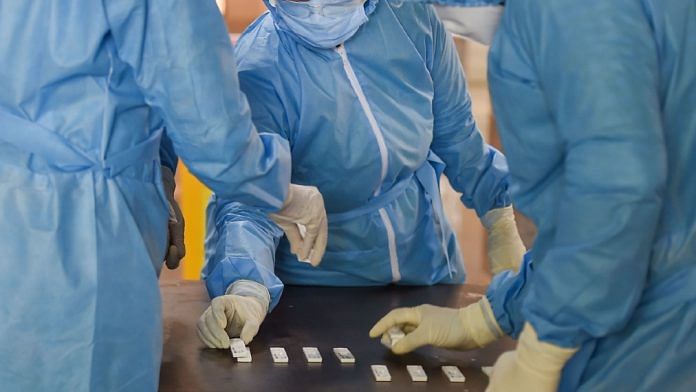
New Delhi: It isn’t just the doctors who treat the living that are at risk of being infected with Covid-19, but also those who deal with the dead.
To ensure that doctors conducting autopsies do not get infected, many hospitals are now testing bodies for Covid-19 before sending them for post-mortem, ThePrint has learnt.
For instance, in Safdarjung Hospital, both identified and unidentified bodies are being tested for the virus before a post-mortem.
“There are clear instructions that before any case is sent to the mortuary, a sample of the body has to be taken and tested for Covid-19,” a source at the hospital said.
“In these times, each body that comes to the hospital should be considered as a probable carrier of the virus which may spread the infection, and hence must be tested. This is because even if a person has died of some other illness, we cannot be sure if he or she was infected or not,” the source added.
“After the dead body is brought in, a sample is first taken. Then the body is sent for preservation, till the reports come. The autopsy is conducted only after the test results are out and we are sure that it is not carrying the virus,” he said.
The bodies of patients who die of Covid-19 are also not being sent for post-mortem at any hospital across the country.
“We have been asked to carry out an autopsy on Covid-19 positive body only if absolutely unavoidable. Till now we have not got any such case,” the source said.
Also read: In pandemics, forensic pathologists deal with morgues, mass graves and infectious remains
Disposing bodies
Determining if a body has the coronavirus not only protects personnel but also ensures that it is disposed of properly without further endangering anyone.
According to the source at Safdarjung Hospital, there is a clear procedure of disposal for infected bodies.
“Most hospitals now have body disposal committees that ensure that Covid-19 positive bodies are cremated or buried after proper procedure,” he said.
If a body is found to be Covid-19 positive, then it is not directly handed over to the family. It is not allowed to be taken home and someone from the hospital accompanies the family to the cremation ground to ensure there is minimum contact between people and the body.
“We coordinate with the police and also the cremation staff. The body is disposed of in presence of the hospital staff so that unnecessary handling of the body can be prevented,” he said.
Also read: June Almeida — the woman who discovered first coronavirus but was told she was wrong
‘Minimal autopsy’
Even though bodies are supposed to be tested for Covid-19 before being sent for an autopsy, some hospitals do not have enough kits to carry out the testing. Sometimes, the test result can be faulty.
Thus, forensics teams have been asked to follow a set of guidelines while doing an autopsy for any body.
According to a source in the All India Institute of Medical Sciences (AIIMS), the teams have been advised to carry out a “minimal autopsy” or “no internal dissection”.
“Sometimes the bodies can be asymptomatic and so they may not test positive at the first go and may still carry the virus. Hence, we ought to be extra cautious while dissecting them,” the AIIMS source said.
“That is the reason we are now going with minimal autopsy, which includes CT scan and other measures, or minimal or no internal dissection. This at least puts the person conducting the autopsy at minimal risk,” he said.
Safdarjung Hospital, on the other hand, does not have equipment for a minimal autopsy and so they conduct a complete body dissection but while wearing proper gear.
“Wearing personal protective equipment is absolutely mandatory, especially in these times, while conducting an autopsy,” a second source from the hospital said.
Also read: R0 data shows India’s coronavirus infection rate has slowed, gives lockdown a thumbs up
Lesser workload, but higher risk
For forensic teams, autopsies are just part of the work they do. Given the lockdown, crime rates have dropped, which has resulted in their workload reducing by half. However, it has meant they need to be more cautious while dealing with bodies due to Covid-19.
“Murder cases are almost nil but we are still getting bodies of the homeless, many of them unidentified and even natural deaths. The accident cases, though have decreased, but are still being reported as many people (have been) driving recklessly due to empty roads,” a second source from AIIMS said.
“Most cases have almost come down by half as compared to our normal workload but our work has certainly become riskier as we are more likely to catch the virus if we err in taking proper precautions,” the source said.
Also read: Sick doctors, shut hospitals, no guidelines — a Wockhardt doctor on India’s Covid response

What others hospital are doing before conducting postmortem on regular basis….are they testing too every body for covid19 or they using PPE And N 95 for every case???
What others hospital are doing before conducting postmortem on regular basis….are they testing too every body for covid19 or they using PPE And N 95 for every case